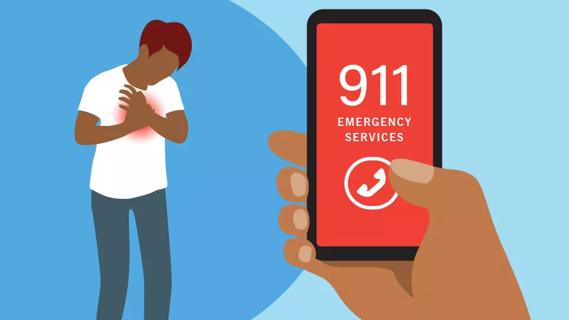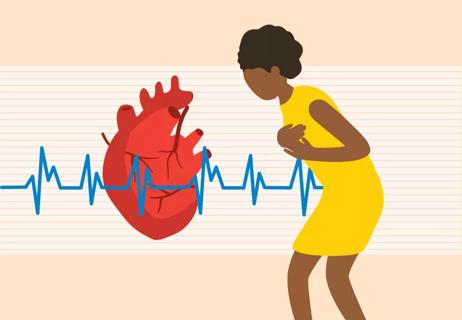Lifestyle choices involving food, exercise, sleep and more can help reduce your risk

Statistics say someone in the United States will have a heart attack within the next 40 seconds. Blood flow to their heart will either stop or be severely reduced. Death or permanent heart damage is possible.
Advertisement
Cleveland Clinic is a non-profit academic medical center. Advertising on our site helps support our mission. We do not endorse non-Cleveland Clinic products or services. Policy
It’s safe to say that is a situation we all want to avoid.
Now the good news: The choices you make in life can reduce your risk of a heart attack (myocardial infarction) or the severity of such an event. So, what’s the secret to a happy heart? Cardiologist Luke Laffin, MD, has the answers.
Your heart is the pump at the center of a 60,000-mile system of blood vessels in your body. That massive network of arteries, veins and capillaries runs from your head to toe in a closed loop that begins and ends at your heart.
Keeping those blood vessels open is key to your circulation system working efficiently. A blockage of any sort can halt or slow blood flow, causing a heart attack.
Here are nine things you can do to help keep your blood flowing.
Extra weight places an extra-large burden on your heart and cardiovascular system. It can damage blood vessels, drive up blood pressure and elevate cholesterol — health factors connected to greater heart attack risk.
A screening tool known as body mass index (BMI) typically is used to define obesity and overweight. The formula uses height and weight to estimate body fat.
A BMI of 30+ is the traditional benchmark for obesity; 25 to 29.9 is categorized as overweight. Falling in either category increases your risk of a heart attack. The higher your BMI, the higher the risk.
Advertisement
Where you carry excess weight matters, too, notes Dr. Laffin. “Belly fat” around your midsection can lead to increased buildup of plaque in the walls of your arteries, making a heart attack more likely.
Bottom line? Losing even a few pounds can significantly improve your heart health and reduce your heart attack risk.
If you dump greasy garbage down a sink, odds are you’ll be dealing with clogged pipes at some point. That same reality applies to the food you eat and heart attack risk.
If you regularly eat foods high in saturated fat, sugar and sodium, you’re at risk of gumming up your system, says Dr. Laffin. Over time, foods in those categories can lead to plaque buildup and clogged arteries.
That means limiting menu choices such as red meat, fried foods and highly processed foods.
So, what should you be piling on your plate? The gold standard for heart-healthy eating is the Mediterranean diet, so named because it reflects the traditional eating patterns in countries bordering the Mediterranean Sea.
The Mediterranean diet is loaded with:
“A 2018 New England Journal of Medicine study showed that this way of eating goes beyond improving your cholesterol and blood pressure,” notes Dr. Laffin. “It also lowers your risk for stroke and heart attack.”
Other diets, such as a whole-food, plant-based eating style, may also lower your risk. But less data suggests they help reduce the risk of strokes and heart attacks, adds Dr. Laffin.
Look to establish a sustainable eating plan: “It doesn’t help to go on a restrictive diet, and then, two years later, go back to eating junk,” he says. “Think 30-plus years into the future.”
Your heart is a muscle — and muscles grow stronger with exercise. Strengthening your ticker allows it to pump more blood through your body, which helps keep arteries more open and flexible for better blood flow.
“Getting your heart rate in an aerobic training zone maintains that heart-pumping, or systolic, function, which can reduce heart attack risk,” explains Dr. Laffin.
Regular physical activity also can lower blood pressure, improve cholesterol and keep your weight in check. As mentioned, those are all steps in the right direction to make a heart attack less likely.
To keep your heart healthy, the American Heart Association (AHA) recommends at least 150 minutes of moderate-intensity exercise each week. (“Moderate intensity” means you can have a conversation while in action — so a brisk walk or light jog counts.)
Advertisement
If you up the exercise intensity level to high, 75 minutes (or more) of activity will get the job done.
“Working out two to five times a week can help stave off heart disease,” Dr. Laffin adds.
In case you haven’t noticed, two key measures of heart health — blood pressure and cholesterol — keep coming up. Both are “hidden” health factors that aren’t visible by just looking at your body.
Knowing your numbers in these areas and others allows you and your healthcare provider to better assess your heart attack risk, notes Dr. Laffin. This is especially important as you age (heart attack risk rises as you get older) and if you have a family history of heart disease
Medical experts recommend the following screenings to stay on top of heart health:
Advertisement
“Information gained from these screenings can help you create a plan to better protect your heart,” says Dr. Laffin.
Nearly 1 in 3 adults around the world have high blood pressure. Elevated cholesterol is even more common, affecting 39% of the global population. Diabetes, meanwhile, affects about 10% of people.
Why bring up all those statistics? It’s to emphasize that a lot of folks are dealing with conditions that bring increased heart attack risk.
Managing those conditions through lifestyle changes (such as diet and exercise) may help lower your risk of a heart attack, encourages Dr. Laffin. Healthcare providers also may prescribe medications to better control the conditions. If so, keeping up with them is essential.
Smoking a cigarette releases more than 7,000 chemicals — and that toxic collection isn’t exactly heart-friendly. This gunk can cause atherosclerosis, a hardening and narrowing of your arteries from plaque.
This plaque buildup can eventually reduce blood flow to your heart and trigger a heart attack. (Add it to the long list of issues caused by smoking.)
The good news? If you stop smoking, you reduce your risk of a heart attack within 24 hours of snuffing out that final cigarette. Within a year, your risk of heart disease drops to half that of someone who currently smokes.
Advertisement
“Quitting smoking or avoiding the habit is an absolute must to protect your heart,” stresses Dr. Laffin. Talk to a healthcare provider to find the best smoking cessation method for you.
Tipping back a few too many beers or cocktails can take a heavy toll on your heart. In fact, downing excessive amounts of alcohol in a single night is guaranteed to ratchet up your blood pressure.
“If you have three or more drinks in one session, your blood pressure will be higher the following day,” shares Dr. Laffin.
If imbibing and elevated blood pressure becomes a regular occurrence, your risk of a heart attack increases. Excessive alcohol use can even change the shape of your heart, a condition known as alcohol-induced cardiomyopathy.
So, what does that mean to the average person? Let’s start with this: If you’re going to drink beer, wine or liquor, it’s best to do so in moderation.
The Dietary Guidelines for Americans recommends limiting alcohol consumption to two alcoholic beverages (or fewer) a day for men and one alcoholic beverage (or fewer) a day for women.
“Drinking less is better for health than drinking more,” the Guidelines state.
And drinking no alcohol at all is best of all.
Chronic stress sets off a negative chain reaction throughout your body. Count your heart and cardiovascular system among the areas hit hardest.
How so? Well, constant stress can increase the buildup of problematic plaque in your arteries. Stress also can cause your arteries to constrict, which in extreme cases can trigger a heart attack. Add a spike in BP to the worry list, too.
If you find yourself frequently stressed out, explore activities that can help you relax, recommends Dr. Laffin. Consider trying various types of meditation or seek out help from a mental health professional.
Here’s a statistic that might keep you up at night: Research shows that people with insomnia are almost 70% more likely to have a heart attack than those who get enough solid shuteye after going to bed.
Not getting enough sleep can drive up your blood pressure, which — as we all know by now — can increase heart attack risk. Most adults need seven to nine hours of sleep each night.
If you’re having trouble sleeping, try getting on a regular bedtime schedule. Other tips to improve sleep include limiting screen time before going to bed, cutting out bedtime snacks and keeping your bedroom cool.
Can you take every possible precaution and still have a heart attack? Absolutely, says Dr. Laffin. Your genetics can lead to a heart attack despite you doing everything right when it comes to lifestyle choices.
But there’s no doubt that building heart-healthy habits improves your long-term odds.
Learn more about our editorial process.
Advertisement

Mild heart attacks may cause less damage, but they can still lead to serious complications and require medical attention

Congenital heart disease, genetic conditions and unhealthy lifestyle habits can put teens at higher risk for heart attack

Recognizing subtle symptoms, like cold sweats, stomach discomfort and nausea, could be the key to survival

Absolutely! In fact, in many ways, exercise is key to recovery

There’s no way to stop it once a heart attack is happening, but the most important thing you can do is to call for help

To help determine what you’re experiencing, focus on how the pain feels, the location of the pain, when it started and how long it lasts

Symptoms may be mild, but don’t be fooled — any heart attack is serious

Sedentary lifestyles are driving up heart attack numbers in the under-40 crowd

If you’re feeling short of breath, sleep can be tough — propping yourself up or sleeping on your side may help

If you fear the unknown or find yourself needing reassurance often, you may identify with this attachment style

If you’re looking to boost your gut health, it’s better to get fiber from whole foods